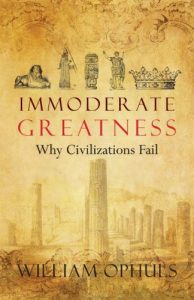Date: 15 September 2019
Location: Linda & Reynolds
The Happy Bookers met on Sunday, 15 September, 2019, at the home of Linda and Reynolds. The book under discussion was Immoderate Greatness: Why Civilizations Fail by William Ophuls.
The first point to come up was the question of what he meant by “civilization”, and whether his examples are representative. A consensus emerged that the real focus is on the world civilization at this time. The world has become interconnected and “civilization” now means the institutions of humankind.
Overpopulation drew attention early on as the major critical problem—an intractable one. The universal impulse to procreate can’t be changed. China’s one child policy did not work. Only an enormous natural disaster or a huge war would enable us to start over. A Canticle for Leibowitz builds on this scenario, depicting a new start after an atomic apocalypse and ending with another atomic apocalypse. We are looking for the colonization of Mars for a new beginning.
Like procreation, human beings’ are motivated by self-interest, which says we must look to success. So, though the end of Immoderate Greatness holds out some hope, it is not persuasive. Instead we must find solutions. Sufficient energy would solve many problems, and we have many techniques for producing energy (i.e., electricity), including solar panels, wind farms, dammed rivers, and tides. Nuclear energy (atomic fission) holds promise, including the workable solution concerning spent fuel rods: send them to the sun via rocket—or by a space elevator, which is theoretically possible. Another design uses the spent rods as fuel. And then nuclear fusion remains a possibility. Cold fusion turned out to be a hoax.
— John
